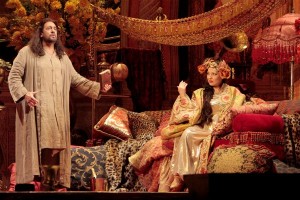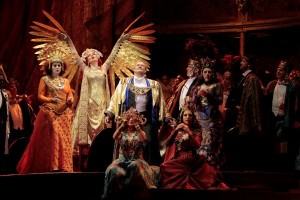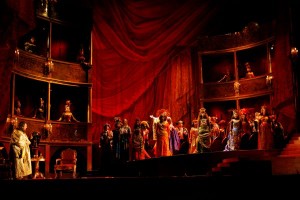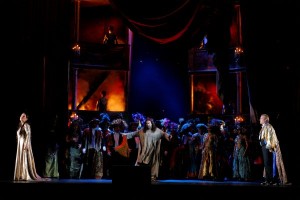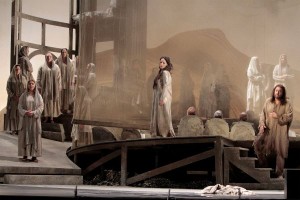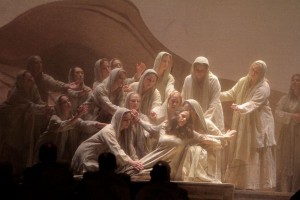ALL THAT GLITTERS IS NOT GOLD
Headlining Plácido Domingo and Georgian soprano Nino Machaidze, the extravagance of LA Opera’s production of Massenet’s 1894 opera, Thaïs, is a veritable banquet of visual delights (this version was first seen in Seville in 2012, and also starred both Domingo and Machaidze). Thaïs tells the story of the celebrated fourth-century Alexandrian courtesan, Thaïs, who finds salvation in Christianity through the coercive attempts of the Cenobite monk, Athanaël. But as Thaïs journeys towards conversion, her beauty consumes Athanaël, concluding in his declaration of love for her.
The story both renders and demands a rigid interpretation of its two central characters in much the same way that French composer Jules Massenet achieved with his two preceding operas, Manon (1884) and Werther (1892). French conductor Patrick Fournillier honors Massenet’s profound and painterly music, moving the score with both sensitivity and an affecting sensuous orchestral appeal. Disconcertingly, Massenet’s music and the central story are mired by ostentatious staging, which seems to belong elsewhere and destroys the story’s original contrasts.
Director Nicola Raab catapults the original setting well beyond the fourth century. From what can be gathered, Thaïs becomes a celebrated performer of a 19th-century burlesque theater, which represents the excesses and hedonism of Alexandria. Surprisingly, there is no mention of this divergence in the program booklet and no director’s note makes clear the artistic choices. Johan Engels’ sets and costumes are immensely stunning and Linus Fellbom’s considered lighting creates visually attractive drama, but all goes to waste on this perplexing adaptation.
While the richly gowned Cenobite monks in the Act I opening scene are acutely atypical of the parsimony associated with that order, Athanaël, though aptly dressed in an austere robe, appears an uninvited guest amongst his own brethren, who seem to be dressed for a night at the opera. When the next scene reveals the glorious interior of a 19th-century theater, any further hint of fourth-century Alexandria is eliminated.
Making her entrance in scene two as a flamboyantly winged bird amongst an equally curiously attired entourage, the expected erotically charged Thaïs is reduced to queer theatrical entertainment. The sumptuous sets then continue into Act II where Thaïs’s private and intimate chamber is an intricate interior of citrus, peach, gold, and crystal furnishings. Extraordinary it is, but the spectacle camouflages Thaïs and distracts both the emotive power of her meeting with Athanaël and her subsequent contemplation on her perishable beauty and empty life in the signature aria, “Dis-moi que je suis belle.” By this time, the dramatic rendering is sadly compromised. And when an audience is partly focused on the English translation, the distractions are further amplified.
There is a highlight as the compelling “Méditation” scene begins and Thaïs’s chamber reverses to the rear of the stage. Athanaël re-enters and the two principals shine in their first truly uncluttered chance to salvage the plot. Unfortunately, shortly thereafter, the buffoonery of silken and bejeweled theater rioters, upset at Thaïs’s departure from the theater, displaces any further trust in Raab’s disparate choices. Act III is more successful. Visually expressive in its warm ochre colors, and structurally by its revolving stage depicting the convent as the former theater in ruins, the setting is successfully utilized for dramatic character movement.
But overall, the artists struggle to outperform the burdensome scenography and peculiar costuming. Initially, however, there is a trusting comfort when Plácido Domingo, as Athanaël, makes his remarkable entrance. Descending a narrow, lofty, skeletal, spiral staircase, Domingo rouses well-deserved applause for his opening aria “Hélas! Enfant encore,” which he delivers with pathos and confidence. Domingo maintains charisma and conviction, moving about the stage with incredible energy, all the while belying his septuagenarian years. Domingo’s stature, however, is not enough to steer the juggernaut production on a favorable course.
Once liberated from her feathery folly, Nino Machaidze settles comfortably, radiating purity and confidence; in so doing, she vocally overcomes patches of nervous, punctuated phrasing and shortened finishes. Machaidze’s sweet, angelic tone and rich, elastic strength finally awaken and reach their height in Act III’s stirring duet with Domingo, “Baigne d’eau mes mains et mes lèvres.” Together, the performance belongs to Domingo and Machaidze, but even so, their intertwined emotional and dramatic union is mildly inconsistent.
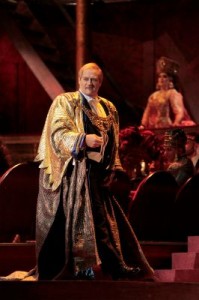 Mother Albine, the Abbess of the convent which Thaïs enters, is portrayed tenderly and compassionately by the Serbian mezzo-soprano, Milena Kitic, in a voice of matching sincerity. She is joined admirably by her chorus of nuns who add celestial force to Massenet’s music. Valentin Anikin depicts the sturdy religious leader of the Cenobite monks, Palémon, with resonant vocal authority but lacks his character’s requisite expression of wisdom and guidance, overpowered by the strength of Domingo’s Athanaël. And as Nicias, Athanaël’s old friend, Paul Groves exhibits all the gesticulated moves of an impresario (even though Nicias is a nobleman in the original story), in a mostly handsome and gutsy tenor voice.
Mother Albine, the Abbess of the convent which Thaïs enters, is portrayed tenderly and compassionately by the Serbian mezzo-soprano, Milena Kitic, in a voice of matching sincerity. She is joined admirably by her chorus of nuns who add celestial force to Massenet’s music. Valentin Anikin depicts the sturdy religious leader of the Cenobite monks, Palémon, with resonant vocal authority but lacks his character’s requisite expression of wisdom and guidance, overpowered by the strength of Domingo’s Athanaël. And as Nicias, Athanaël’s old friend, Paul Groves exhibits all the gesticulated moves of an impresario (even though Nicias is a nobleman in the original story), in a mostly handsome and gutsy tenor voice.
Certainly, Domingo’s greatness, the production’s lavishness, and the orchestral strength account for the positive reception, but this beautiful and rarely staged work requires a special understanding. In conveying opera’s plethora of rich stories, reinvention is welcome and exciting; but in this instance a misguided interpretation sadly blankets what should very well be a meditative journey at the theater.
photos by Robert Millard
Thaïs
Los Angeles Opera
Dorothy Chandler Pavilion, 135 N Grand Ave
scheduled to end on June 07, 2014
in French with projected English translations
2 hours and 50 minutes, including one intermission
for tickets, call 213.972.8001 or visit www.LAOpera.org

